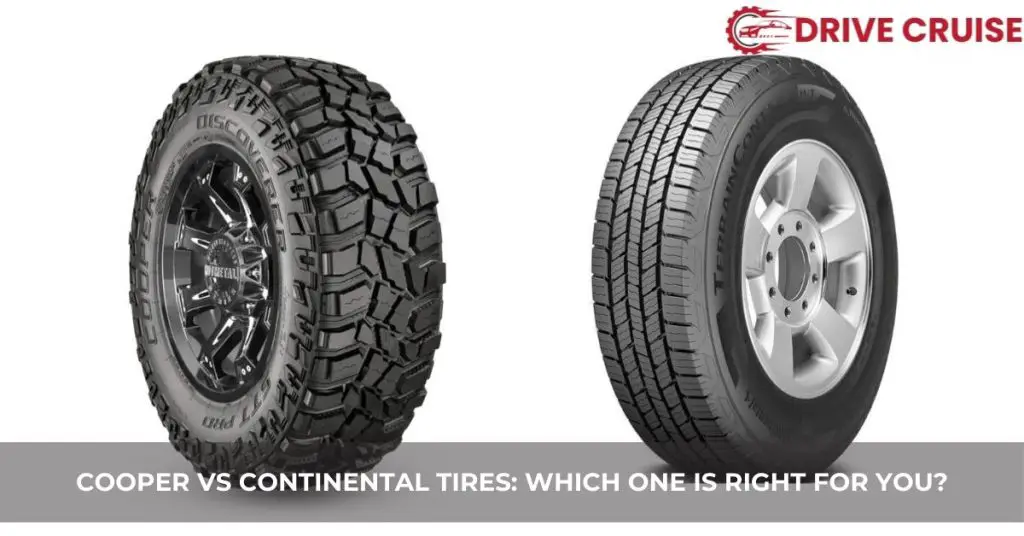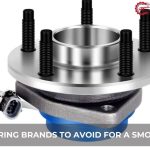When it comes to keeping our vehicles running smoothly and safely, choosing the right tires is crucial. It’s a decision that can affect everything from fuel efficiency to comfort and, most importantly, safety. Among the myriad of options available, Cooper and Continental tires stand out as leading choices for many drivers. But how do we decide which is the best fit for our needs?
In our quest to make this decision easier, we’ll delve into the key differences between Cooper and Continental tires. Both brands bring their unique strengths to the table, and understanding these can help us make an informed choice. Whether we’re looking for durability, performance, or value for money, it’s essential to weigh our options carefully. So, let’s get rolling and find out which tire brand might just be the perfect match for our vehicles.
Overview of Cooper Tires
Transitioning from the overall importance of selecting the right tires, let’s dive into the specifics of Cooper Tires to help inform your decision. Established in 1914, Cooper Tire & Rubber Company has carved a niche for itself in the global tire industry. Known for its commitment to quality, the brand offers a wide range of tire options for various vehicle types, including passenger cars, trucks, and SUVs.
One key aspect that sets Cooper Tires apart is their focus on producing affordable yet high-quality tires. They strike a balance between cost and performance, offering drivers a value proposition that’s hard to overlook. Their tires are designed with innovative technologies that enhance tread life, improve fuel efficiency, and ensure safety under varying road conditions.
Moreover, Cooper Tires emphasizes the development of all-season and weather-specific tires, such as winter and summer tires, catering to the diverse needs of consumers. Whether navigating wet roads or tackling snowy terrains, Cooper Tires provides reliable performance and traction. For off-road enthusiasts, Cooper’s range of all-terrain tires offers the durability and grip needed for challenging adventures.
Another noteworthy feature is Cooper’s attention to rides comfort. They engineer their tires to reduce road noise and provide a smooth driving experience, enhancing the overall comfort of your journey.
If you’re considering Cooper Tires for your vehicle, you’re looking at a brand that delivers on durability, safety, and comfort across a broad spectrum of tire types. Their products present an appealing mix of innovation, performance, and value, making Cooper Tires a worthy contender in the tire selection process. Let’s keep this detailed understanding in mind as we explore the specifics of Continental Tires next, ensuring a comprehensive comparison.
Overview of Continental Tires
Transitioning from Cooper Tires, let’s delve into what makes Continental Tires stand out in the automotive industry. Founded in 1871, Continental AG, the parent company, has established itself as a beacon of innovation and quality within the tire manufacturing world. Known for their uncompromising commitment to safety, performance, and eco-friendliness, Continental Tires cater to a broad spectrum of vehicles, including passenger cars, trucks, and commercial vehicles.
One of Continental’s core strengths lies in their pioneering technology and extensive research and development efforts. Key innovations include the ContiSeal technology, designed to automatically seal punctures in the tire tread, and the ContiSilent technology, which significantly reduces tire road noise, ensuring a quieter and more comfortable ride. Furthermore, Continental’s investment in testing under extreme conditions ensures their tires offer optimum performance, whether that’s providing excellent grip on wet roads or offering high handling precision.
Continental also takes pride in its eco-friendly initiatives. The company focuses on reducing rolling resistance in its tires, a critical factor that enhances fuel efficiency by minimizing energy lost as heat when tires roll on the road. By doing so, Continental Tires not only elevate a vehicle’s performance but also contribute to reducing CO2 emissions, aligning with global sustainability goals.
In terms of product range, Continental presents an extensive portfolio including summer, winter, and all-season tires, each designed with specific compounds and tread patterns to excel in relevant weather conditions. This includes the renowned ExtremeContact sport tire line, known for providing excellent grip and handling on both wet and dry surfaces, making it a top choice for performance enthusiasts.
In comparison to Cooper Tires, Continental Tires emphasize technological advancements, superior safety features, and environmental consciousness within their product development strategy. This focus on cutting-edge technology and sustainability makes Continental Tires a preferred option for drivers prioritizing these aspects in their tire purchase decision.
Performance Comparison
Diving into the performance comparison between Cooper and Continental tires, we find distinct features and benefits from both brands that cater to different driver needs and preferences. Let’s explore how they stack up against each other in terms of traction, durability, and handling.
Traction
- Cooper Tires: Known for delivering reliable traction in various driving conditions, Cooper tires feature deep tread designs and unique tread compounds. For instance, models like the Discoverer AT3 4S excel in off-road environments and also perform commendably on wet and snowy roads, ensuring drivers have a secure grip no matter the terrain.
- Continental Tires: Continental takes traction seriously, especially with their ContiWinterContact and CrossContact series, offering unparalleled grip on icy and snow-covered roads. The use of their advanced silica compounds in the tread design enhances wet road traction, making Continental tires an ideal choice for drivers in regions prone to heavy rain or snow.
Durability
- Cooper Tires: Cooper’s tires are designed with a focus on long-lasting wear. Their tread designs and compounds aim to maximize tire life, making them a cost-effective option without compromising on performance. The Cooper CS5 Ultra Touring, for example, offers exceptional treadwear ratings, translating to longer tire life.
- Continental Tires: Continental matches durability with innovative technology. Their DWS (Dry, Wet, Snow) indicators serve as a guide for tread wear, indicating when tires no longer perform optimally in certain conditions. This feature, combined with their robust construction, means Continental tires offer robustness and longevity, albeit often at a higher price point.
- Cooper Tires: Offering a comfortable and responsive driving experience, Cooper tires ensure that handling doesn’t take a backseat. Their passenger tires, like the Zeon RS3-G1, provide sporty handling, making them suitable for drivers who enjoy a dynamic driving experience.
- Continental Tires: With a reputation for precision engineering, Continental tires offer superior handling, particularly at high speeds and in challenging driving situations. The Continental ExtremeContact Sport, for instance, is favored for its excellent road feedback and stability, catering to the performance segment.
Price Comparison
Moving on from performance aspects, we’ll delve into the price comparison between Cooper and Continental tires. Understanding the cost of these tires is crucial for making an informed decision that aligns with one’s budget and needs.
Cooper tires stand out for their affordability, making them an excellent choice for drivers seeking a balance of cost and performance. For example, the Cooper CS5 Ultra Touring, known for its exceptional handling and durability, typically ranges from $100 to $150 per tire for a standard sedan. This price bracket ensures quality without breaking the bank, appealing to a broad range of consumers.
In contrast, Continental tires, with their focus on advanced safety features and technological innovations, tend to be at a higher price point. The Continental ExtremeContact Sport, celebrated for its superior handling and high-speed capabilities, often has a price range of $150 to $200 per tire for similar vehicles. These tires target consumers prioritizing cutting-edge technology and top-tier performance, albeit at a higher cost.
To illustrate, let’s compare two popular models for SUVs and light trucks: the Cooper Discoverer AT3 4S and the Continental TerrainContact A/T. The Cooper model typically sells for between $120 and $180, depending on the size and specifications. On the other hand, the Continental equivalent may range from $160 to $220, reflecting the premium for its advanced engineering and performance attributes.
Ultimately, the choice between Cooper and Continental tires involves weighing the importance of affordability against the desire for advanced safety features and performance enhancements. Both brands offer distinct advantages in their price ranges, catering to different segments of the automotive market. By considering both the initial investment and the expected longevity and performance of the tires, drivers can select the option that best meets their needs and expectations.
Customer Feedback and Reviews
Transitioning from our comparison of pricing and performance between Cooper and Continental tires, we delve into how customers perceive these brands. Real-world feedback and reviews offer invaluable insights into the long-term performance and reliability of tires, reflecting user experiences beyond the specification sheets.
Cooper Tires: Affordability Meets Satisfaction
Customers often praise Cooper tires for their exceptional value. Many users highlight the durability and comfort of models like the CS5 Ultra Touring, noting their tires have outlasted expectations. Affordability without compromising on performance seems to be a recurring theme. Reviews frequently commend the traction and control on various surfaces, especially praising the Discoverer AT3 4S for its capability in both off-road and on-road conditions. Feedback often mentions satisfaction with the balance between price and quality, suggesting Cooper tires are a smart choice for those wanting reliable performance without straining their budget.
Continental Tires: Premium Experience Endorsed
Continental tires receive accolades for their advanced safety features and superior handling on diverse terrains. Customers investing in models like the ExtremeContact Sport often acknowledge the noticeable difference in grip and stability, especially under adverse weather conditions. The technology-driven approach of Continental tires is a significant point of satisfaction, with reviews highlighting the peace of mind offered by enhanced safety features. Despite the premium price, loyal customers argue the cost is justified by the prolonged tire life and performance improvements. Reviews of the TerrainContact A/T celebrate its versatility, asserting it as an excellent option for drivers seeking confidence across all driving scenarios.
Customer feedback for both Cooper and Continental tires aligns well with their brand propositions. Cooper remains favored for its balance of cost-efficiency and reliability, while Continental is preferred for its technological advancements and performance excellence. This real-world endorsement reaffirms the importance of selecting a tire that aligns with individual driving needs and preferences.
Environmental and Sustainability Considerations
When considering Cooper and Continental tires through the lens of environmental impact and sustainability, it’s essential to highlight how each brand approaches these critical issues. Both companies have taken significant steps to ensure their manufacturing processes and products align with modern sustainability practices, albeit with some differences in their areas of focus and implementation strategies.
Cooper Tires emphasizes the use of eco-friendly materials and recycling initiatives. They’ve made strides in reducing waste and improving energy efficiency across their production facilities. By innovating in the development of tire compounds, they seek to minimize negative environmental impacts. Cooper’s commitment to sustainability is also evident in their efforts to extend tire life, thereby reducing the frequency of tire replacement and, in turn, the environmental footprint.
Continental Tires, on the other hand, places a strong emphasis on lowering rolling resistance in their products, which directly contributes to fuel efficiency and, consequently, to a reduction in CO2 emissions from vehicles. Their research and development focus heavily on creating tires that not only perform exceptionally in terms of safety and durability but also are made from sustainable materials. Continental’s approach includes analyzing the entire lifecycle of the tire, aiming to enhance its environmental performance from production to disposal.
Both brands are actively involved in developing technologies and practices that lessen their impact on the environment. Cooper’s use of sustainable materials and recycling efforts, alongside Continental’s focus on fuel-efficient designs and life cycle analysis, reflect their commitment to environmental stewardship. Choosing between Cooper and Continental tires, from an environmental perspective, depends on prioritizing either the manufacturing process and materials used (Cooper) or the product’s performance in terms of energy efficiency (Continental).
Ultimately, both companies’ efforts contribute to the broader automotive industry’s shift towards more sustainable practices, demonstrating a shared commitment to protecting the environment while continuing to meet consumers’ needs.
Conclusion
We’ve navigated through the intricate details of Cooper and Continental tires, weighing their pros and cons in terms of performance, price, and sustainability. Whether you’re leaning towards Cooper for its exceptional value and durability or favoring Continental for its cutting-edge safety features and performance, it’s clear both brands offer compelling choices. Their dedication to environmental sustainability, though approached differently, underscores a shared commitment to the planet. Ultimately, the decision rests on what you value most for your driving experience. Let’s make a choice that aligns with our needs, preferences, and the world we all share. Happy driving!
Related Posts:














